A clean bill of health: Harnessing data for precision healthcare

Unlike other industries, UK healthcare isn’t defined by how much revenue can be generated. Instead, success is measured in terms of achieving positive health outcomes for patients.
With new healthcare data available from a variety of sources -- such as wearables, clinical trials and biometric sensors -- healthcare is now driven as much by the promise of data processing and advanced analytics as it is by developing new and specialized drugs. So, how can healthcare professionals move faster, and gain actionable insights from the huge volumes of data they collect?
Different Treatments for Different Patients
No two individuals are the same. And this means the standard one-size-fits-all, or groups of cohorts approach, is no longer the best way to determine patient care. This is where precision healthcare can help. By using a data-driven approach, healthcare professionals can tailor treatments and prevention strategies to the individual characteristics of each patient.
By using data and AI-powered advanced analytics, healthcare professionals can proactively predict and prevent disease, as well as identifying the most effective course of treatment. In addition, analyzing data from a variety of sources -- like genome sequence, microbiome composition, health history, lifestyle, diet, and environmental factors -- enables healthcare providers to better understand of every patient’s unique health profile.
How to Bring Data into Diagnosis
One of the key advantages of precision healthcare is the ability to use large datasets to identify patients at a higher risk of developing a particular disease. For example, if a patient has a family history of colon cancer, genetic testing can be used to determine if they have an increased risk of developing the disease. Armed with this intelligence, healthcare professionals can then develop a personalized prevention and screening plan.
Data is also used to identify the most effective treatments for each patient. By analyzing a patient’s genomic makeup using machine learning (ML) algorithms, healthcare providers can identify specific mutations or genetic markers that may indicate a particular treatment will be more effective than others. For example, a patient with a certain genetic mutation may respond better to a specific chemotherapy drug than other patients with the same type of cancer.
Precision healthcare is also reliant on data from other sources, such as electronic health records (EHRs) and wearable devices. For example, wearable devices can track a patient’s heart rate, activity level, and sleep patterns, providing insights into their overall health and well-being. This data can be used to identify early warning signs of potential health problems or adverse reactions to their care plan, allowing healthcare providers to intervene early and prevent more serious complications.
From a research and development perspective, data is vital. By using machine learning to analyze large amounts of data from diverse populations, researchers can identify new patterns and relationships that can inform the development of new treatments and prevention strategies.
Harnessing Healthcare Data
With more access to data than ever before, healthcare organizations now need the ability to strategically manage and secure their entire data lifecycle. Precision healthcare relies on the ability to collect and analyze massive amounts of data from a wide range of sources: unstructured, semi-structured, structured and streaming. This data must be accurate, complete, and standardized, so that healthcare providers can make decisions in real time.
This is where having a unified data platform is essential, as it can ingest, process, store and analyze any type of data on-premise, in the cloud or at the edge. By analyzing data at rest, in motion and streaming, healthcare organizations can then use advanced analytics, machine learning, and AI to identify patterns, detect anomalies and predict potential outcomes.
By giving their data management practices a regular health check, healthcare providers will be able to prescribe innovative treatments quicker and with even greater precision -- which is a positive outcome for healthcare professionals and patients alike.
The Data Lake Solution
Healthcare data is growing exponentially. But unless organizations can effectively process, store and analyze this data, they will not benefit from any increased positive health outcomes, or rapid development of new treatments and therapies.
Regardless of where it’s stored, healthcare data needs to be in the right hands quicker than ever before, so that healthcare providers can drive value in real-time. As a result, providers with a hybrid data platform that enables them to harness their data in a rapid, cost-effective manner -- no matter where it is located -- will achieve more positive health outcomes, and save more lives.
Image Credit: everything possible / Shutterstock
Nasheb Ismaily is Senior Solutions Engineer, Public Sector at Cloudera.